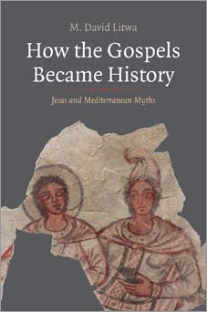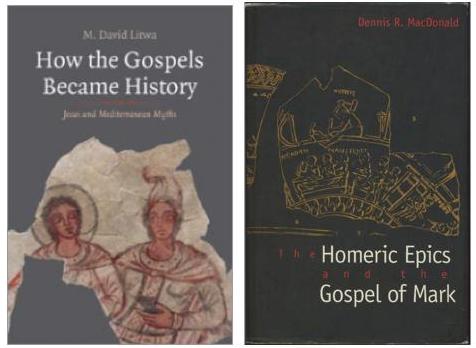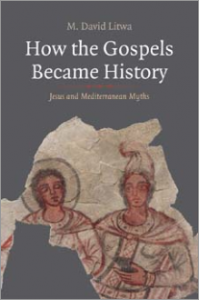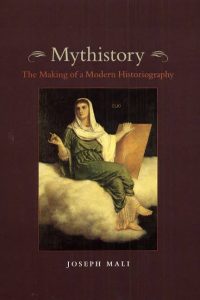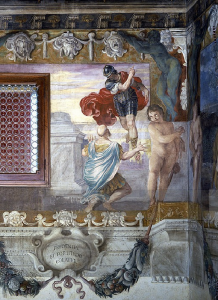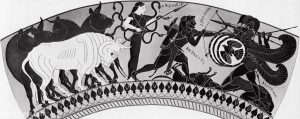An interesting chapter from Greek Influence in Jewish Eschatology by T. Francis Glasson (1961). Make of it what you will . . . .
. . . . The system of belief which gathered around his name [Orpheus] included transmigration, regarded the body as the prison or tomb of the soul, and attempted to show how men could find deliverance from bodily life and the circle of re-birth, and so return to their original divinity.
A myth described how Dionysus, the child of Zeus, was slain and devoured by the Titans. In his anger Zeus destroyed them with a thunderbolt; from their ashes sprang the race of men. Mankind thus consists partly of an evil element (Titanic) and partly of a good element (Dionysiac). The problem was how to get rid of the former so that the latter could be restored to its true home in the divine sphere. Man was, in Empedocles’ words, a wanderer and a fugitive from the gods. Orphism by its purificatory rites and its way of life offered the true mode of salvation.
. . . . while the final goal was a purely spiritual life freed from all bodily complications, much was said of the long process, consisting of alternating experiences on earth and in the underworld, which for most people would intervene before they were ready for final emancipation. It is a great mistake to associate Greek eschatology only with the doctrine of the immortality of the soul. The Greeks had a lot to say about punishment in the underworld, and it was the Orphics who were their teachers.
Enoch 21: 4 Then I said: “For what sin have they been bound, and why have they been thrown here?” 5 And Uriel, one of the Holy Angels, who was with me and led me, spoke to me and said: “Enoch, about whom do you ask? About whom do you inquire, ask, and care? 6 These are some of the stars which transgressed the command of the Lord Most High, and they have been bound here until ten thousand ages are completed; the number of days of their sin.”For most people there would be . . . at least ten earthly lives; each one would begin a thousand years later than the preceding, and the intervals would all be taken up by retribution in the beyond. The whole process would thus take 10,000 years. Those who chose the life of a philosopher three times in succession would escape further re-incarnations and would be ready for complete deliverance from earthly life, final release for the soul from its prison. Plato’s Phaedrus puts it in this way:
But among all these, whosoever passes his life justly afterwards obtains a better lot, but who unjustly, a worse one. For to the same place, whence each soul comes, it does not return till the expiration of 10,000 years; for it does not recover its wings for so long a period, except it is the soul of a sincere lover of wisdom, or of one who has made philosophy his favourite. But these in the third period of a thousand years, if they have chosen this life thrice in succession, thereupon depart, with their wings restored in the three thousandth year. Others are tried, sentenced some to places of punishment beneath the earth . . . others to some region in heaven . . . in the thousandth year they choose their next life.
Empedocles in one of his fragments says that the fallen daemon must wander thrice ten thousand seasons from the abodes of the blessed. According to Dieterich three seasons per year were recognized at that time, so that the same period of 10,000 years is meant.
Pindar, Olympian Ode 2: . . . those who gladly kept their oaths enjoy a life without tears, while the others undergo a toil that is unbearable to look at. Those who have persevered three times, on either side, to keep their souls free from all wrongdoing, [70] follow Zeus’ road to the end, to the tower of Cronus, where ocean breezes blow around the island of the blessed, and flowers of gold are blazing, some from splendid trees on land, while water nurtures others.There are traces of Orphism in Pindar and he too says that those who have thrice led a blameless life will be sent to the islands of the blessed in the kingdom of Cronus (Olympian Odes ii. 68). There are of course numerous other references to the main outline of this scheme in ancient literature. Two of the fullest and best known are the myth of Er in Plato’s Republic (book 10) and Virgil’s Aeneid (book 6). The famous gold plates will be referred to later . . . .
When we consider the possible bearing of all this upon Jewish teaching, we notice that too often recent writers have been inclined to restrict the Greek influence on Jewish eschatology to the immortality of the soul. For other aspects of the future life they have looked elsewhere, especially to Persia. May not the case have been rather as follows? The Jews did not accept the doctrine of repeated re-incarnations and a succession of earthly lives, nor did they regard the body as a prison-house. But some of them accepted the doctrine of punishments and rewards under the ground; while others held to the immortality of the soul. One is as Greek as the other.
The Orphic scheme should be looked at in its entirety. It included:
A. Recompense in the underworld, with different treatment for good and evil, and
B. The final return of the soul to the divine realm.
Now, some Jewish developments reflect more particularly the influence of A—as in Enoch 22 with its conception of different lots for good and evil in the future. We might add for consideration the idea of a return to earthly life, which the Jews called resurrection, though Josephus expresses it as a kind of reincarnation.
Other Jewish developments, particularly in the Diaspora, reflect the influence of B — Philo, Wisdom of Solomon, 4 Maccabees.
We make a mistake in recognizing Greek influence only in the latter case. What happened was virtually a separation of the two parts of Orphic teaching. The Jews already had a doctrine of the Day of the Lord, and this and other beliefs made it impossible for them to accept anything like the entire Greek scheme.
As mentioned in an earlier chapter, life in the Messianic kingdom is not described in Enoch 1-36 as going on for ever. It is patriarchal in its duration, but the clear implication is that it will close with old age.
But for the elect there shall be light and grace and peace, And they shall inherit the earth.
And then there shall be bestowed upon the elect wisdom.
And they shall all live and never again sin . . .
And they shall not again transgress.
Nor shall they sin all the days of their life.
Nor shall they die of (the divine) anger or wrath,
But they shall complete the number of the days of their life.
And their lives shall be increased in peace.
And the years of their joy shall be multiplied,
In eternal gladness and peace,
All the days of their life (5. 7-9).So also in 25. 6:
And they shall live a long life on earth,
Such as thy fathers lived:
And in their days shall no sorrow or plague
Or torment or calamity touch them.If this is the life to which the righteous are raised, it is clear that it is not strictly everlasting life; it is more like a reincarnation.
It is sometimes affirmed that nothing could be further from Greek thought than Jewish teaching on resurrection, that the Greeks thought of deliverance from the body as the desirable goal. Yet it should be pointed out that the Platonic-Orphic eschatology, while certainly envisaging deliverance from bodily life as the final goal, nevertheless taught quite definitely that for most people there would be a return to bodily life on the earth. Whether we call this “resurrection” or not is mainly a matter of terms.
5 R. H. Charles, writing on the eschatology of Enoch 1-36, says: “There is no hint as to what becomes of the righteous after the second death” (Hastings’ Dictionary ot the Bible, i. p. 742)There are admittedly great differences between Jewish eschatology and Greek. It is perfectly true that the Jews did not accept such a doctrine as transmigration (except in later periods, when it was taught in the Kabbala), nor was the resurrection-life presented as a further probation or disciplinary experience. But the question at the moment is: Is there a possibility that Greek teaching suggested to the Jews, or to some of them, that the dead would be raised from Sheol to live again on the earth, which is what resurrection implied at that time ? It is curious that they seem to have left quite open the further and ultimate fate of those who, as in the Greek scheme, lived again on earth for a limited period.5 They did not follow the Greeks in envisaging successive lives on earth alternating with periods in Hades, but they appear to have had nothing at first to substitute.
It is usual to point to Iranian parallels in connection with the resurrection and this may after all prove to be correct. But it is worthy of consideration that the view of a return to bodily life was taught by the Greeks and may possibly have played a part (even if a subsidiary one) in the early stages of the Jewish doctrine of resurrection. In limiting the term of this further earthly experience, as seems to be the case in Enoch 1-36, the Jew appears to stand with the Greek rather than the Persian.
Josephus explains the Pharisaic belief in resurrection in terms of re-incarnation: “the souls of good men only are removed into other bodies”. There is also the phrase in Antiquities xviii. 1. 3; “revive and live again”. I do not press this as Josephus may have been expressing himself in ways intelligible to his Roman readers who of course were familiar with ideas of re-incarnation.
The possibility of a connection between the Jewish doctrine of resurrection and the Greek view of re-incarnation occurred to me independently some time ago, but I have subsequently noticed that I. Levy claims quite confidently that the former found its origin in the latter:
The first of the two stages distinguished by the Pharisaic doctrine, that of punishments and rewards in Hades, is indisputably a borrowing from Hellenism on the part of the Diaspora. The second stage, re-entry of the soul in a body, is also exactly parallel to the re-incarnation which brings the soul of the dead into the world of the living. Thus we meet again . . . the whole round of the doctrine of metempsychosis, the sequence of (1) sojourn in Hades and (2) palingenesis. We thus see the true origin of the idea of resurrection. [p. 255]
For my own part I do not wish to speak with the same degree of definiteness as this but the possibility can certainly not be denied and should be taken into consideration in accounting for the emergence of the resurrection doctrine.
Another important aspect of the question should be mentioned before we pass on. The inquiry into the origin of the Jewish doctrine of resurrection is interlocked with the date of Isaiah 24-7, since these chapters contain the first mention of the subject in Jewish writings:
Thy dead shall live; my dead bodies shall arise (26. 19).
Some authorities date the whole section in the Maccabean period (Duhm, Marti). Bousset-Gressmann say that these four chapters possibly arose at the end of the third century or later. W. Rudolph also places this whole section in the Greek period, and while he thinks that the bulk of it comes from the period 330-300 b.c. soon after the conquests of Alexander, he excepts three small sections including the verses which deal with the resurrection. He inclines to the view that the doctrine did not emerge as early as the fourth century and that the verses which deal with it may be a later insertion. It is therefore most likely that the doctrine of resurrection emerged at a time when Greek thoughts were circulating in Palestine, so that the possibility mentioned above is not to be ruled out on the score of dates.
(Glasson, 26-32)
Glasson, T. Francis. 1961. Greek Influence in Jewish Eschatology: With Special Reference to the Apocalypses and Pseudepigraphs. S. P. C. K.


